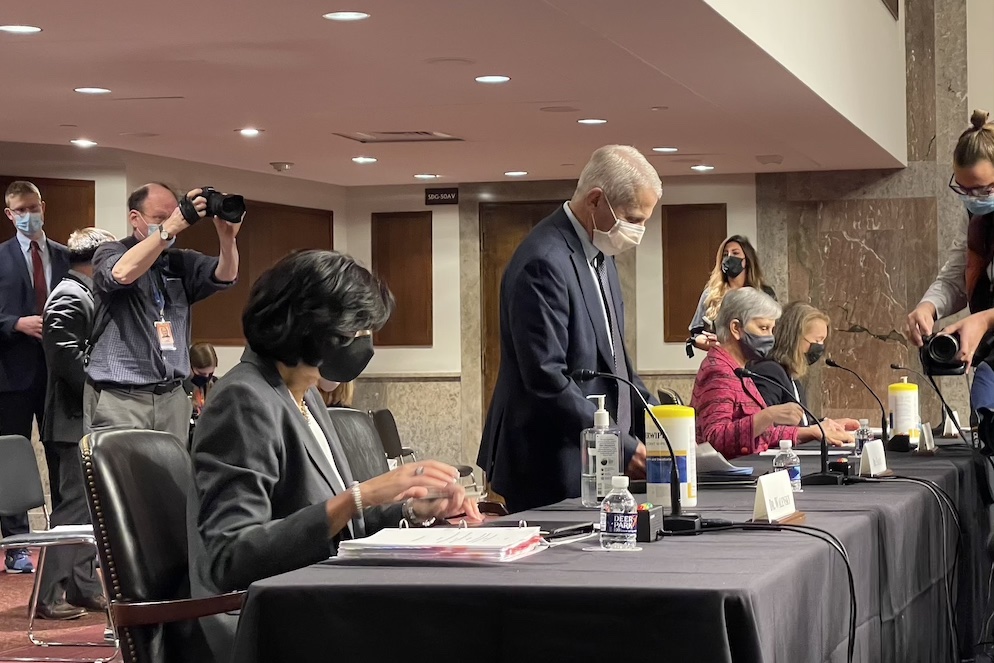WASHINGTON — Dr. Anthony Fauci, chief medical adviser to the president, and Sen. Rand Paul, R-Ky., once again traded barbs at a Senate hearing Thursday after Paul accused Fauci of starting the COVID-19 pandemic by funding risky biological research in Wuhan, China.
Paul pressed Fauci to admit guilt and said he should resign. But Fauci would have none of it.
“I have a great deal of respect for this body of the Senate, and it makes me very uncomfortable to have to say something, but he is egregiously incorrect,” Fauci said during the Senate House, Education, Labor and Pensions Committee hearing on the next steps in the government’s response to COVID-19.
Paul accused Fauci of approving the National Institutes of Health funding in gain-of-function research in Wuhan since 2014. Gain-of-function research is a controversial type of biological research that studies future viruses before they emerge from nature so scientists can learn how to combat them.
Fauci, who is head of the National Institute of Allergy and Infectious Diseases, did not deny the funding but said the research could not lead to the COVID-19 pandemic because the viruses involved were evolutionarily distant from SARS-CoV-2, which is the virus that caused COVID-19.
“I’m unwilling to take any responsibility for the current pandemic. I have no responsibility for the current pandemic,” Fauci said.
Paul made similar comments when Fauci testified before the committee in July.
U.S. intelligence agencies on Friday released an unclassified report saying they have reached a broad agreement that the virus was not developed as a biological weapon or through genetic engineering and that China’s officials did not know about the virus before the initial outbreak in Wuhan. The origins of the virus remain unknown, they suggested.
At the hearing, Centers for Disease Control and Prevention Director Dr. Rochelle Walensky noted that about 9,000 children ages 5 to 11 have been infected since the beginning of the pandemic and 97 have died.
“As a mother, I know that no parent should have to see their child face long-term complications of an infection or to be hospitalized. We now have a highly effective tool to prevent this disease in our children,” she said.
On Tuesday, the CDC approved emergency authorization for Pfizer’s vaccine in children age 5 to 11. The child doses are about a third of the doses given to adults. Pediatricians and schools are getting ready to roll out the vaccines this week. Walensky said at the hearing that the vaccine is found to be 91% effective in preventing infections in children in that age group.
Last month, federal regulators authorized booster doses of Moderna’s vaccine for people age 65 and older and those with underlying medical conditions at higher risk of exposure — and they approved extra doses of Pfizer’s vaccine for the same groups the previous month.
Regulators also approved a booster to Johnson & Johnson’s one-shot vaccine for all recipients over the age of 18, as well as “mixing and matching” booster doses among the three available vaccines.
Fauci commended new COVID-19 therapeutics developed by Merck and Ridgeback. In a recent clinical trial, the drug decreased hospitalization and death by 50% in the treated individuals compared with the placebo group, he said.
Walensky emphasized that vaccinations and testing are the first ways to combat COVID-19, but “we need as many tools in this toolbox as possible.”
As Thanksgiving and winter holidays approach, Fauci said in a recent television interview, for families whose members are vaccinated, “there’s no reason at all why you can’t enjoy the holidays in a family way, the way we’ve traditionally done it all along.”
Walensky said at the hearing that as she looks toward the coming weeks and months with some optimism, but “we need to be humble in our response to this virus and to follow the science as we modify evidence and address the pandemic.”
Last winter, U.S. COVID-19 cases increased by 180% in the two and a half months between Nov. 1 and Jan. 13, according to the CDC. The rapid rise coincided with the emergence of the Delta variant, a more contagious strain of the virus that’s now dominant in U.S. infections.
Additionally, a new subvariant known as Delta-plus has been found in Britain and accounted for about 6% of all coronavirus cases for the week beginning Sept. 27, according to the U.K. Health Security Agency.
Eight states have reported nearly a dozen cases of the new strain, according to outbreak.info, a project investigating COVID-19 that’s supported by the CDC. The strain has not been proven to cause more serious illness.



